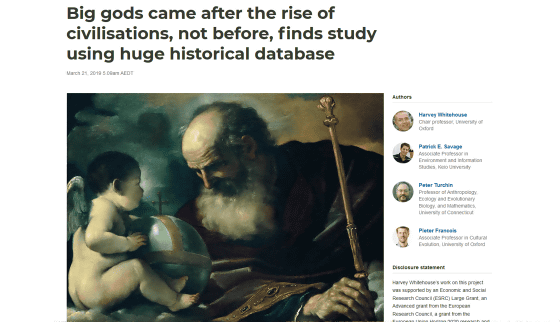Religion that believes in 'God's punishment' clearly appears after the population has rapidly increased

When you think about 'religion,' many people think that bad people are punished by God. However, it seems that the element that a great existence actually monitors human morality is not so universal, and researchers at Oxford University and Keio University researched 'when religion that believes in God's punishment appears' doing.
Complex societies precede moralizing gods throughout world history | Nature
Big gods came after the rise of civilisations, not before, finds study using huge historical database
https://theconversation.com/big-gods-came-after-the-rise-of-civilisations-not-before-finds-study-using-huge-historical-database-113801

The “god” commonly associated with many people is someone who monitors the actions of people and sometimes punishes them. However, in small traditional societies, there are many cases where a paranormal existence is supposed to be a spiritual world that does not care about human morality. The research team points out that the spiritual world in a small society does not monitor the activities of human society, but focuses on whether individuals carry out their obligations to supernatural beings and respect them. I will.
Nevertheless, the major religions that many modern people are accustomed to use mechanisms such as divine punishment,
Another hypothesis is that 'believing in a religion that believes in the' God's eye of oversight 'is advantageous in situations of increasing social complexity.' Anyone who believes in a transaction that they 'believe in the omnipotent and omnipotent God and that injustice will result in punishment' tends to be considered less likely to commit injustice. As a result, the complexity of society has increased the opportunities for dealings with strangers, and as a result, the 'religion for morality' that gives people peace of mind may have become more popular.

There are many hypotheses about the religion of morality and the complexity of societies, but 'whether the emergence of a religion of morality increased social complexity, or social complexity. With regard to the question, 'Did this result in the emergence of a religion that seeks morality?', The previous studies did not reach a consistent conclusion. One
Therefore, researchers conducted analysis using a large-scale open access database ' Seshat ' to investigate how 'religion seeking morality' was born. thing. The name 'Seshat' is named after Seshath , the goddess of wisdom, knowledge, and description of ancient Egypt, and many scholars have worked together to add data over the past 10 years.

Data on social complexity, religion, war, agriculture, and other cultural and social functions of civilizations around the world can be traced back to 10,000 years ago. Using this extensive database, the research team added social complexity due to the emergence of religion seeking morality, or due to increased social complexity appeared religion seeking morality I investigated whether or not.
The research team found that 414 social groups in 30 regions that existed in the history of the past 10,000 years had 51 measures of social complexity and 4 measures of moral coercion by supernatural beings. The analysis was performed using the scale. As a result, it became clear that 'the religion seeking morality appears after the social complexity has risen sharply .'
The graph below shows that the higher the vertical axis is, the more social complexity increases, and the horizontal axis shows the time. While the social complexity remains low, the ritual element remains a strong religion, but only after the sudden rise in social complexity, the 'god seeking morality' appeared. You can see that According to the research team, religions seeking morality tend to appear around the time when the total population of the social group exceeds 1 million.

The research team is also using Seshato to study the factors that increase social complexity, and 'daily or weekly regular meetings' tend to appear at the early timing of increasing social complexity It has also been discovered. In addition, hints to clarify whether the decline of religion in modern society causes the collapse of cooperation among diverse groups, or whether the existence of God can be replaced with other forms of surveillance are also used. The research team said.
Related Posts:
in Note, Posted by log1h_ik







